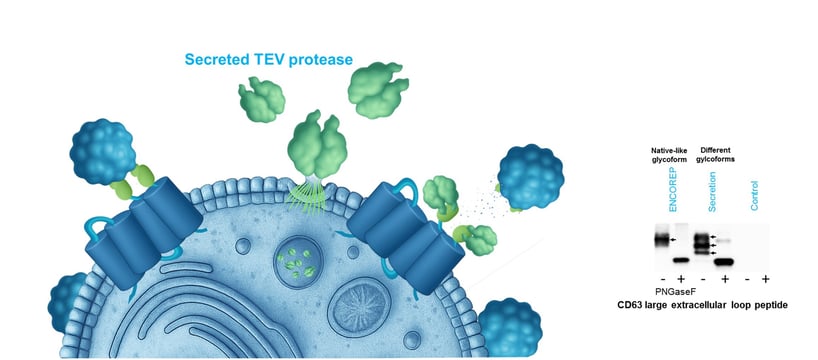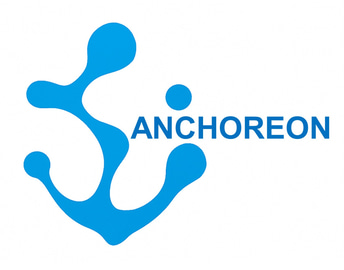ENCOREP
From Cell Surface to


Enzymatic-Controlled Release of Proteins (ENCOREP) is an innovative technique that enables the in situ expression and enzymatically controlled release of glycosylated proteins directly at the cell surface.
ENCOREP bypasses the secretory pathway, representing a breakthrough in the production of native, glycosylated proteins for research and therapeutic innovations.This method overcomes limitations of traditional approaches, providing a rapid and reliable way to obtain heavily glycosylated peptides.
An optimized Tobacco Etch Virus (TEV) protease for the ENCOREP system is produced and secreted by the same cells displaying the protein of interest. This enables precise and efficient release of proteins or peptides from the cell surface. The released proteins or peptides can then be collected from the supernatant.
Why It Matters
Maintain Native Glycosylation Glycosylation is critical for protein folding, stability, solubility, localization, and immunogenicity. ENCOREP captures these native modifications intact—something traditional methods can’t match.
Isolate Difficult Targets
ENCOREP has already succeeded where other approaches have failed, such as isolating highly glycosylated peptides from the large extracellular loop of CD63.
Streamlined Workflow
From in situ expression to protease-triggered release, ENCOREP offers a rapid, reliable, and reproducible pipeline—ideal for research, diagnostics, and therapeutic development.
Potential Applications of the ENCOREP System
Immunization & Vaccine Studies
Expression of antigens with species-specific glycosylation patterns, such as Influenza HA stalk-based antigens, enabling more physiologically relevant immune responses in preclinical models.
Cancer Immunotherapy
Production of glycopeptides for use in tumor-targeted therapies, improving specificity and therapeutic efficacy.
Anti-inflammatory & Anti-thrombotic Therapies
Expression of RGD peptides, known for their role in integrin binding and modulation of inflammation and thrombosis pathways.
Antimicrobial Therapeutics
Generation of Antimicrobial Peptides (AMPs), offering potential alternatives to conventional antibiotics by directly targeting microbial membranes.
Autoimmune Disease Modulation
Expression of peptides derived from MHC Class II extracellular domains, with applications in rebalancing immune tolerance in autoimmune conditions.
Transfect. Express. Collect.


Supernatant, Seamlessly.
Reference
Ivanusic D., Madela K., Burghard H., Holland G., Laue M., Bannert N. tANCHOR: a novel mammalian cell surface peptide display system. Biotechniques. 2021 Jan;70(1):21-28.


Contact Us
Get in touch for inquiries about tech applications and life sciences in pharma and biotech research.

Insights
Explore tANCHOR applications in life sciences research.
Solutions
a n c h o r @anchoreon.com
+49 15679635953
© 2025. All rights reserved.
